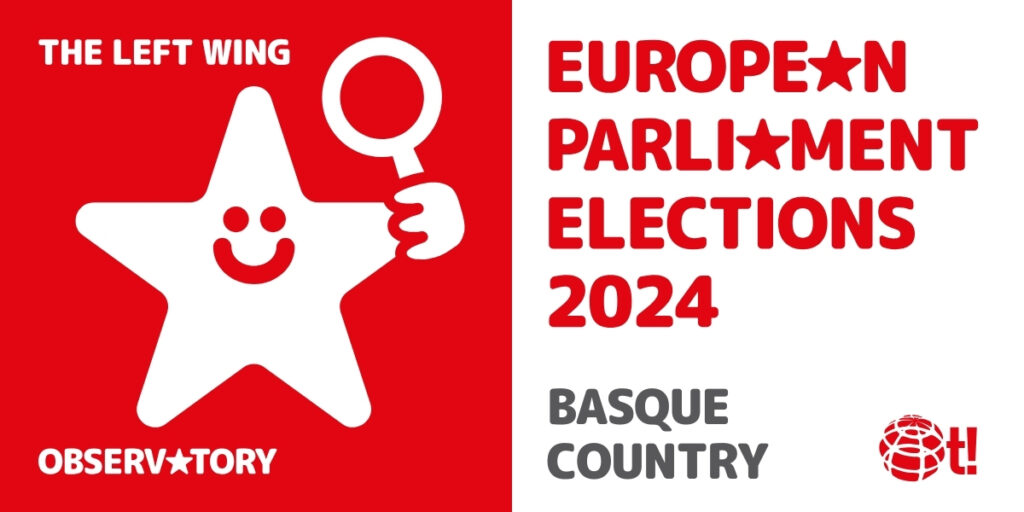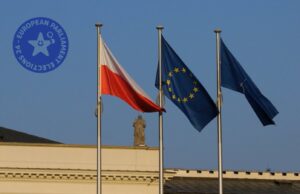
European elections emerge as the second round of Basque regional battles, amplifying the struggle for hegemony between the Basque Nationalist Party (PNV) and Euskal Herria Bildu (EH Bildu). Amidst global turmoil, issues like the ongoing climate crisis, migration, and national rights will shape the political landscape. Dive into the context shaping this pivotal electoral showdown.
The Basque Country (Euskal Herria) is a nation divided into two states and three main institutional bodies: the Basque Autonomous Community (CAV) and the Foral Community of Navarre (CFN) in the Spanish state, and the Basque Municipal Community in the French state. This article will focus on the Spanish geographical area, where Basque Country Unite (EH Bildu – Euskal Herria Bildu) is participating in the European elections.
The European elections take place in a very specific context: a month and a half after the regional elections in the Basque Autonomous Community, where, for the first time in the recent history of our country, the pro-sovereignty left could win the majority of the seats up for grabs.
The conservative Basque Nationalist Party (PNV – Partido Nacionalista Vasco), affiliated with the European Democratic Party (EDP) at the European level, has historically been the party that has governed the Autonomous Community, supported, especially in recent years, by the Basque branch of the Socialist Party, which has become the favoured ally of the jeltzales (term used to refer to supporters of the PNV).
However, there is a perceived shift in traditional voting patterns, a shift through which younger generations increasingly identify with the progressive public policies proposed by the Basque pro-sovereignty left. This is why, among other reasons, EH Bildu has been experiencing an upward trend in recent electoral appointments; for example, in last year’s municipal elections it became the leading municipal force, and in the Spanish general elections of July the pro-sovereignty coalition saw an increase in its representation both in terms of deputies (+1) and senators (+3).
In this context, the European elections are presented by the media as “round two” of the regional elections, another battle in the struggle for hegemony being waged between EH Bildu and the PNV. Furthermore, the pro-sovereignty left faces the challenge of being the most voted force in the two southern provinces of the country, in the Basque Autonomous Community and in Navarre, where the previously mentioned shift in traditional voting patterns is also taking place.
The hegemonic party in Navarre, the conservative regionalist UPN, is undergoing a process of loss of popular support (even though it is still the largest party in the region), increasingly leaning towards the right and progressively losing influence. Out of power since 2015, the alternative in Navarre is a contest between the local branch of the Socialist Party and EH Bildu, which is why the pro-sovereignty coalition emerges as the main alternative in the southern part of the country.
The political reality in the Basque Country is inexorably linked to events in Madrid, where the current government of Pedro Sánchez survives thanks to the support granted by both Basque and Catalan pro-sovereignty forces. The Spanish political reality is stubborn; as of today, there are only two possibilities for government: either the right-wing (PP) governs alongside the far-right (VOX), or the Socialist Party is obliged, in addition to negotiating with the Spanish left, to reach agreements with the pro-sovereignty forces of the nations within the state.
This delicate balance forces the progressive government in Madrid to respond to the agenda set, in part, by the pro-independence parties, bringing to light an issue that the Spanish state has still not addressed almost half a century after the establishment of the autonomous communities back in 1978, following the approval of the Constitution. Spain is a plurinational country, although unionists have sought to ignore this reality until today, and as such, it must be acknowledged that Euskal Herria, Catalonia, and Galicia are nations and, consequently, have the right to decide on their political future.
In this fragile arithmetic, the role played by national leftist parties (such as Podemos and Sumar, among others) is crucial. By democratic logic, they should be the foremost guarantors of the national recognition of stateless nations in Spain. Weaker and more divided than ever in recent history, the historical role of the Spanish left has barely amounted to an effort to democratise the state in national terms, which is one reason for their poor results in the recent elections in Galicia and the bleak prospects they have in the Basque Country.
In this context, EH Bildu has forged a strategic alliance with the Catalan pro-sovereignty party Esquerra Republicana, through which they collaborate in both chambers of the Spanish capital. This alliance will be extended in the upcoming European elections, in which, as was done five years ago, both parties will run in coalition, along with the Galician party BNG and other minor parties. It will be a progressive coalition, in which progressive forces within the Spanish state will be represented. The European affiliation varies among the member parties: while EH Bildu aligns with The Left in Brussels, ERC and BNG are part of the European Free Alliance, where other national and linguistic minorities are also represented.
The European elections are contested in the Spanish State through the format of a single constituency, which means that non-state (or regional) parties must form alliances to ensure their presence in the European Parliament. In the elections five years ago, the alliance “Ahora Repúblicas – Republics Now” managed to secure three MEPs (with one belonging to The Left and the remaining two to EFA,) in total, a result that is expected to be repeated in the upcoming elections. Thus, EH Bildu would ensure the presence of one of its MEPs in Brussels, either for the entire term or having to share with some of the parties presented in the coalition.
The European election campaign has not yet started in the Basque Country, and it will not begin until after the Basque and Catalan elections, which are held on May 12 and have, for obvious reasons, a significant impact on the Basque political landscape. However, what can be done is to foresee the key issues that will shape the campaign for the European elections.
Europe, and the world in general, is immersed in a warlike context unprecedented in recent times. The war in Ukraine and the escalation of tension in the Middle East has made continental security one of the most discussed issues by the parties in dispute. The decline of the United States as the undisputed global hegemon and the consequent emergence of other powers in the dispute for that hegemony (mainly China and Russia, but also certain states belonging to the BRICS), make global stability weaker than ever and force the European continent to reinvent itself. With the disorientation caused by these developments, Europe faces the challenge of fully addressing the issue of strategic autonomy and its own security, understanding this concept in its most holistic meaning, that is, in the sense of human security.
Furthermore, the perception of growing authoritarianism and the increase in popular support for far-right parties, which could lead to a more right-wing European Parliament than ever before, causes genuine concern among citizens. This concern can be addressed from a singular perspective: a return to the origins of the European Union’s birth, to the Europe of the peoples, to the Europe of rights. In that sense, it is more urgent than ever to democratise both the institutions and the decision-making process within the community framework, in order for citizens to believe in this project once again.
Considering the electoral contest from a global perspective, there are a few sectorial issues that will be at the centre of the parties’ agenda. The climate crisis and the resulting energy transition, digitalisation and the use of artificial intelligence, austerity and housing policies, and migration will be on the agenda of all parties. Lastly, but certainly not least important, the national rights of nations without a state in Europe will play a determining role in the voting choices of Basque citizens. This is why issues such as national recognition and the defence of the cultural and linguistic identity of these nations will be central in the electoral programs of Basque sovereigntist parties. Consequently, they will also be key priorities for the coalition Ahora Repúblicas – Republics Now.
Cover photo: Euskal Herria Bildu candidates and politicians. Source: EH BILDU Social Media



